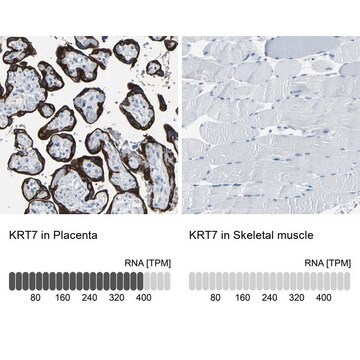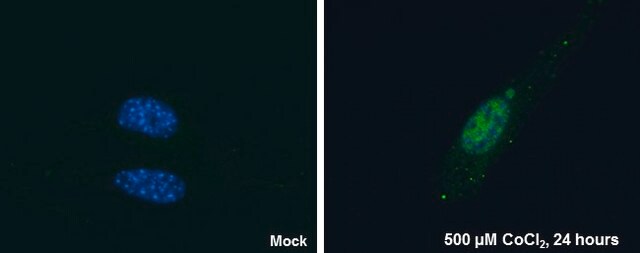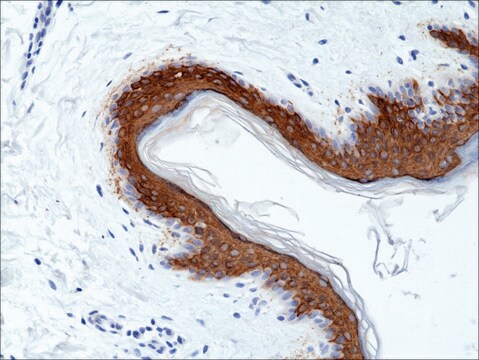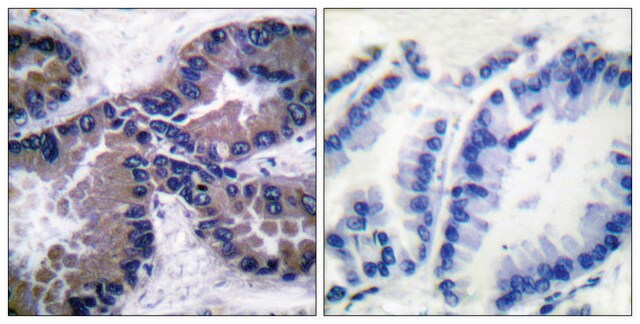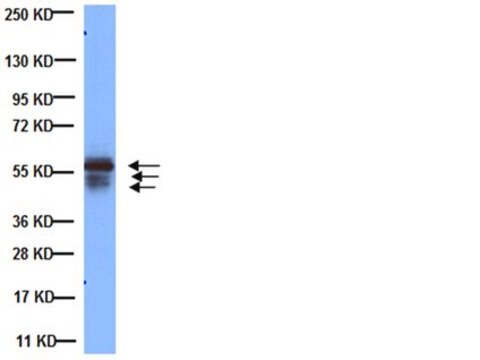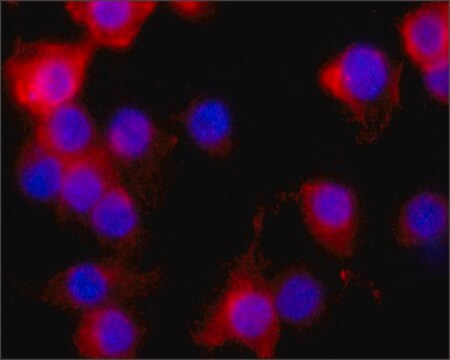일반 설명
We are committed to bringing you greener alternative products, which adhere to one or more of The 12 Principles of Green Chemistry.This antibody is Preservative-free, produced without the harm or sacrifice of animals and exceptionally stable to allow for ambient shipping and storage if needed and thus aligns with "Waste Prevention", "Designing Safer Chemicals" and "Design for Energy Efficiency".
Click here for more information.
ZooMAb® antibodies represent an entirely new generation of recombinant monoclonal antibodies.
Each ZooMAb® antibody is manufactured using our proprietary recombinant expression system, purified to homogeneity, and precisely dispensed to produce robust and highly reproducible lot-to-lot consistency. Only top-performing clones are released for use by researchers. Each antibody is validated for high specificity and affinity across multiple applications, including its most commonly used application. ZooMAb® antibodies are reliably available and ready to ship when you need them.
특이성
Clone 3O4 is a ZooMAb® Rabbit recombinant monoclonal antibody that specifically detects Keratin-7 (CK-7). It targets an epitope within 20 amino acids from the C-terminal region.
면역원
KLH-conjugated linear peptide corresponding to 20 amino acids from the C-terminal region of human Keratin-7 (CK-7).
애플리케이션
Quality Control Testing
Evaluated by Western Blotting in HeLa cell lysate.
Western Blotting Analysis: A 1:1,000 dilution of this antibody detected Keratin 7 in HeLa cell lysate.
Tested applications
Western Blotting Analysis: A 1:1,000 dilution from a representative lot detected Keratin 7 in HepG2 cell lysate.
Flow Cytometry Analysis: 0.1 μg from a representative lot detected Keratin 7 in one million HeLa cells.
Immunohistochemistry (Paraffin) Analysis: A 1:1,000 dilution from a representative lot detected Keratin 7 in human placenta tissue sections.
Immunocytochemistry Analysis: A 1:100 dilution from a representative lot detected Keratin 7 in HeLa cells.
Affinity Binding Assay: A representative lot of this antibody bound Keratin 7 with a KD of 2.1 x 10-6 in an affinity binding assay.
Note: Actual optimal working dilutions must be determined by end user as specimens, and experimental conditions may vary with the end user
표적 설명
Keratin, type II cytoskeletal 7 (UniProt: P08729; also known as Cytokeratin-7, CK-7, Keratin-7, K7, Sarcolectin, Type-II keratin Kb7) is encoded by the KRT7 (also known as SCL) gene (Gene ID: 3855) in human. Keratins are the intermediate filament proteins of epithelia that display high degree of molecular diversity. They are heteropolymeric filaments formed by pairing of type I and type II keratins that are expressed in a highly specific patterns depending on the epithelial type and stage of cellular differentiation. Keratins contain a central rod domain of about 310 amino acids with a-helical conformation bordered by non-helical head and tail domains of variable length. The head domain consists of subdomains V1 and H1. The central a-helical rod domain is composed of subdomains 1A, 1B, 2A, and 2B connected by the linkers L1, L12, and L2. The tail domain then consists of subdomains H2 and V2. They provide stability between epithelial cells and their attachment to basement membrane. Keratins also serve as tumor markers and epithelial differentiation markers. Multiple human epithelial keratins have been resolved with 2D-gels electrophoresis. These can be divided into acidic (pI 5.7) and basic (pI 6.0) subfamilies. The acidic keratins have molecular weights that range from 40 to 55 kDa. The basic keratins have molecular weights that range from 56 to 70 kDa. Members of the acidic and basic subfamilies are reported to be present in pairs. The composition of keratin pairs varies with the epithelial cell type, stage of differentiation, cellular growth environment, and the disease state. Keratin 7 is expressed in cultured epidermal, bronchial, and mesothelial cells. It is observed throughout the glandular cells in the junction between stomach and esophagus but is absent in esophagus. Its expression is also observed in tumor cells of mammary and extramammary Paget disease. Keratin-7 expression can be used to distinguish ovarian and gastrointestinal carcinomas. This ZooMAb® recombinant monoclonal antibody, generated by our propriety technology, offers significantly enhanced specificity, affinity, reproducibility, and stability over conventional monoclonals.
물리적 형태
Purified recombinant rabbit monoclonal antibody IgG, lyophilized in PBS, 5% Trehalose, normal appearance a coarse or translucent resin. The PBS/trehalose components in the ZooMAb formulation can have the appearance of a semi-solid (bead like gel) after lyophilization. This is a normal phenomenon. Please follow the recommended reconstitution procedure in the data sheet to dissolve the semi-solid, bead-like, gel-appearing material. The resulting antibody solution is completely stable and functional as proven by full functional testing. Contains no biocide or preservatives, such as azide, or any animal by-products. Larger pack sizes provided as multiples of 25 μL.
재구성
300 μg/mL after reconstitution at 25 μL per vial. Please refer to guidance on suggested starting dilutions and/or titers per application and sample type.
저장 및 안정성
Recommend storage of lyophilized product at 2-8°C; Before reconstitution, micro-centrifuge vials briefly to spin down material to bottom of the vial; Reconstitute each vial by adding 25 μL of filtered lab grade water or PBS; Reconstituted antibodies can be stored at 2-8°C, or -20°C for long term storage. Avoid repeated freeze-thaws.
법적 정보
ZooMAb is a registered trademark of Merck KGaA, Darmstadt, Germany
면책조항
Unless otherwise stated in our catalog or other company documentation accompanying the product(s), our products are intended for research use only and are not to be used for any other purpose, which includes but is not limited to, unauthorized commercial uses, in vitro diagnostic uses, ex vivo or in vivo therapeutic uses or any type of consumption or application to humans or animals.

